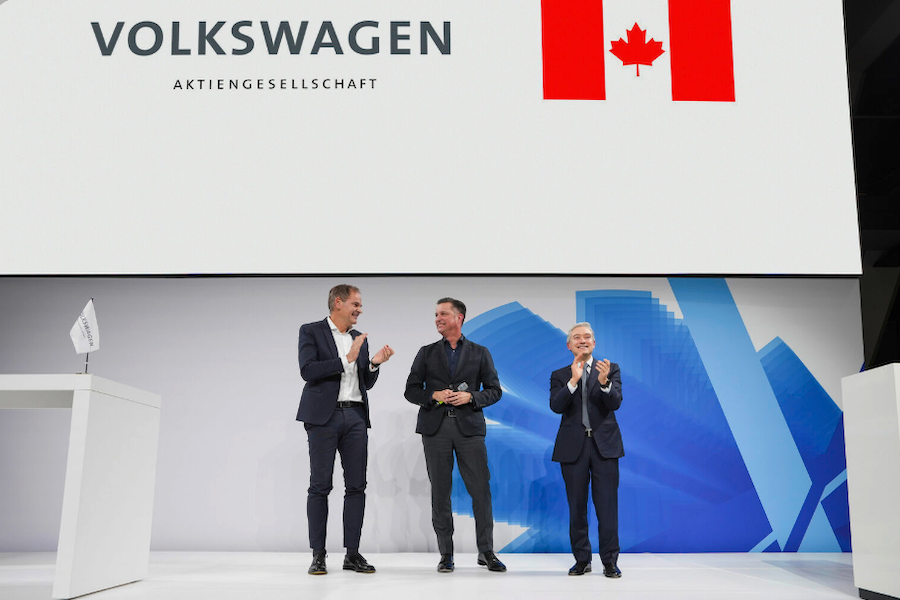ALL CAPITALI$M IS STATE CAPITALI$M
Freeland says production subsidies for Volkswagen will be tax-free, matching the U.S.
, The Canadian Press
Finance Minister Chrystia Freeland said Wednesday that the federal government plans to make the production subsidies it's offering to Volkswagen tax-free to match the incentives offered by the U.S. Inflation Reduction Act.
Her comments came after the parliamentary budget officer published a report saying Canada's contract with the German auto giant to build an electric-vehicle battery plant in southwestern Ontario would cost the federal government up to $16.3 billion over the next 10 years.
That figure is higher than what Ottawa previously said the deal would cost taxpayers, a sum that included a $700-million upfront capital investment and up to $13.2 billion in production subsidies.
The Parliamentary Budget Office estimate included the $700-million contribution for the construction of the plant and $12.8 billion in production support.
However, the PBO said that for the production subsidies to be equivalent to the incentives offered by the U.S., the federal government would have to make tax adjustments totalling $2.8 billion.
That's because the U.S. offers production tax credits that are tax-free, whereas the Canadian subsidies would have to be taxed under current tax legislation.
"The IRA tax credits are not taxable, and so it makes sense that the treatment of our incentives, which are designed to level the playing field, would be comparable. And that is how we will proceed," Freeland told reporters on Wednesday.
She said her government would change current tax legislation to make the subsidies tax-free.
The PBO report published Wednesday provided a fiscal and economic analysis of the construction phase of the facility only, leaving out the operation phase.
Yves Giroux, the parliamentary budget officer, said his office is unable to take on analysis of the costs and benefits arising from the operation of the plant until it receives clearance from the federal government and Volkswagen.
He said the deal includes confidential information regarding minimum production levels that cannot be disclosed directly or indirectly.
"It's very hard to assess without doing further analysis and without being relieved of the confidentiality provisions that cover the production schedule," Giroux said in a media briefing.
The analysis of the construction phase estimated that the deal would create a peak of 3,100 jobs at the start of 2026, but that figure would fall to 1,400 by the end of 2027.
The federal government announced in April the details of the deal — which would see Volkswagen build its first gigafactory outside of Europe —and promised it would create up to 3,000 direct jobs and 30,000 indirect jobs.
This report by The Canadian Press was first published June 14, 2023
Volkswagen subsidy to cost Canada $1.8bn
more than forecast
Reuters | June 14, 2023 |

From left: Oliver Blume, CEO VW Group; Thomas Schmall, Group Board Member Technology; Hon. François-Philippe Champagne, Canada’s Minister of Innovation, Science and Industry. (Image courtesy of Volkswagen Group.)
Canada’s budgetary watchdog estimated on Wednesday that a deal offering Volkswagen production tax credits to build a battery gigafactory in the country will cost taxpayers about C$2.4 billion ($1.8 billion) more than announced.

The forecast comes as the government tries to sweeten a subsidy deal for Jeep maker Stellantis, which stopped construction at a more-than C$5 billion electric vehicle (EV) battery plant in Ontario, saying Ottawa had reneged on promises.
Canada and German carmaker Volkswagen in April together committed more than C$20 billion for the planned Ontario plant, the biggest single investment in the country’s EV supply chain.
This included up to C$13.2 billion in manufacturing tax credits through 2032 and a C$700 million federal grant.
In a review of the deal, Parliamentary Budget Officer (PBO) Yves Giroux said the tax credits would end up costing a bit less than estimated, but Ottawa would need to make about C$2.8 billion in tax adjustments to ensure Volkswagen gets the support it was promised.
Commenting on the report, Finance Minister Chrystia Freeland said that the Volkswagen investment was “fully accounted for” in her budget.
The point of difference stems from the investment’s tax treatment, which Freeland said was because Canada was trying to compete with the US Inflation Reduction Act’s (IRA) non-taxable incentives for clean-tech incentives.
“When the IRA came into force … the US frankly had just changed the game and we knew that Canada had to be at the table,” she told reporters in Ottawa.
Under Canadian law, any monetary support a business receives from the government is considered income, and is therefore taxable. To make the deal match IRA subsidies, the federal government would have to forgive the taxes levied, the PBO said.
Canada, home to a large mining sector for minerals including lithium, nickel and cobalt, is trying to woo companies involved in all levels of the EV supply chain as the world seeks to cut carbon emissions.
Giroux said the economic benefits of the construction of the Volkswagen facility “are marginal”, but the PBO did not estimate the benefits of the factory when it is fully operational.
“We are very confident in the value of the VW investment… we are really confident in the value of our green industrial policy,” Freeland said.
($1 = 1.3283 Canadian dollars)
(By Ismail Shakil; Editing by Alexander Smith and Angus MacSwan)
No comments:
Post a Comment